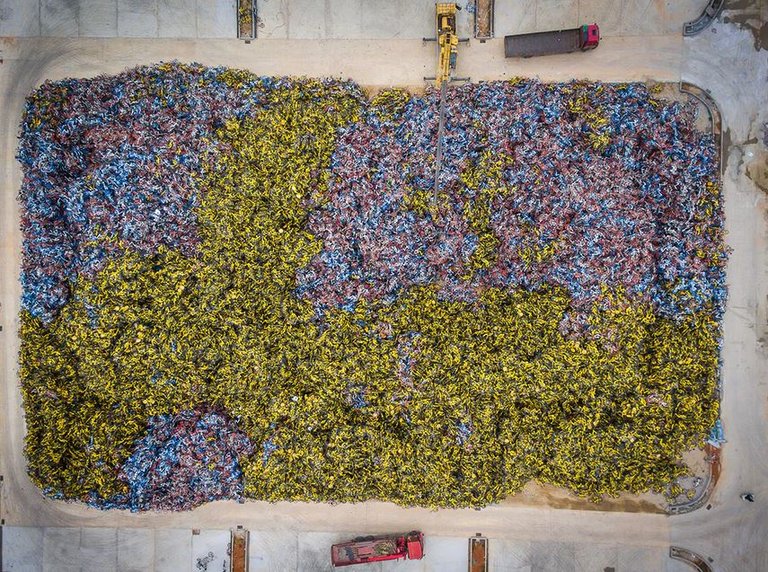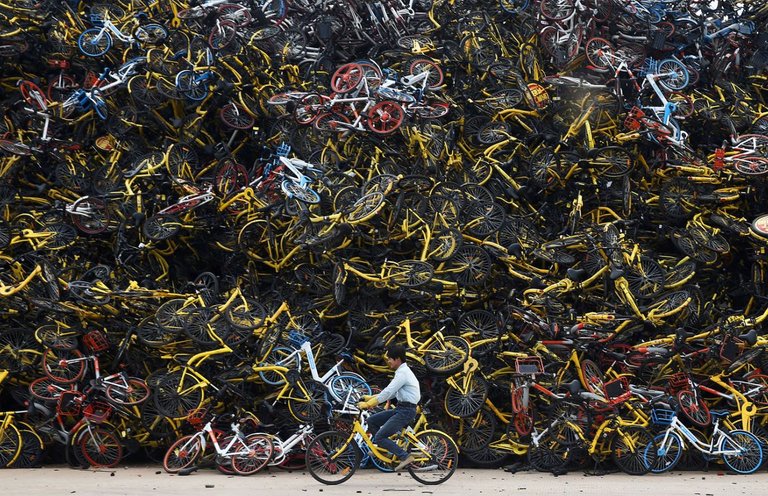
China - the worlds overproducing capital of wastefulness. A few years ago, bike sharing practices started growing in China, bike rental business booming, everything looked mooning and rosy. Imagine a country with a population of nearly 1.5 billion, getting around in urban areas on bicycles should prove to be much easier than on trains, buses, cars.
But, like every other bubble, the bicycle bubble popped as well. As the bicycle renting and sharing industry caught up on the demand, it didn't stop there, it was a total boom. The industry kept growing, eating all excess demand completely leaving a massive suprlus and oversupply.
Bikes were left in random places, abandoned right on the streets. Thousands and thousands of bikes were moved by the government to bicycle housing lots, also called as bicycle graveyards, creating mesmerizing aerial views.
img credz: Chen Zixiang via theguardian.com
Doesn't this art installation above look mesmerizing? Only, it is not an art installation. It is a shared bicycle graveyard in Xiamen. Charging users only pennies for renting a bike, competition has been fierce and if China can keep producing cheap anything, why not bikes? The "always available" bikes have users grabbing a new bicycle every time they need one.
Cities are removing bicycles that have been left blocking roads, stairways, hell - even intersections.
img credz: Costfoto / Barcroft Images via plainmagazine.com
Waves and waves of similar-colored bicycles create syrreal art when viewed from above:
img credz: Pacific Press / Barcroft Images via plainmagazine.com
While the authorities of Hangzhou claim that more than 110,000 tons of gas consumption a year is eliminated, the bicycle waste has taken on enormous proportions. Pictured below is a worker riding along a mountain of dead and abandoned bicycles in a graveyard.
img credz: Reuters via theatlantic.com
Take a look at any of the below articles to see the real extent on the problem. People could soon start building houses from these bicycles.
Materials:
theatlantic.com
theguardian.com
plainmagazine.com
wired.com
Still not selling your vote to Minnowbooster to earn SBD? Do it now
Here's the Byteball AIRDROP starter capital, earning you and me a nice bonus:
https://byteball.org/#textcoin?add-urge-wide-nerve-minor-almost-simple-athlete-opera-boss-excuse-tag
Instructions here
Buy Wizards for the upcoming ultimate battle on the EOS network. You need an EOS account and Scatter Chrome extension
Title image from pixabay


Are you looking for Minnowbooster, Buildteam or Steemvoter support? Or are you looking to grow on Steemit or just chat? Check out Minnowbooster Discord Chat via the link below.

buildTeam.io





@furious-one, For sure, after watching this scene i can only one thing and that is World Of Bicycles, because literally it's reflecting as bicycles consumed the land.
And in my opinion this initiative is good in one perspective and that is, we can reduce the Pollution Levels to great extent and that is really important subject.
But yes, with every update or creation we see positives but for sure we will going to see negatives too, and in this case we read the carelessness mean, leaving the bicycles here and there and causing more issues.
Let's hope that others will also going to take some positive inputs from this aspect and will going to move towards more healthy Lifestyle instead of staying stuck in the world of Pollution.
Wishing you an great day and stay blessed. 🙂
They're almost 5 times the population of the USA. It's an amazingly large population over there and in India.
People have a job - to do bicycles, a lot of work, now a new job has appeared - to take care of the bicycles, everything is in business and there is no unemployment
Very useful and Nice artical
Nice post.
Keep steeming
I really don't understand the logic of the companies making these bikes. Surely this can't be cost effective for them, right?
Not sure - I'm as clueless as you here, pondered that question myself too.